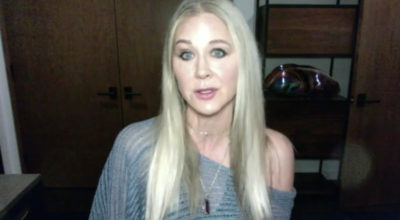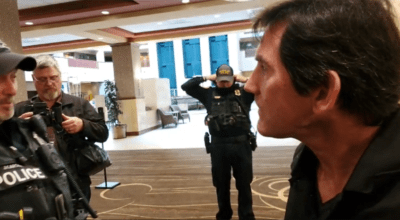

Top judges in Tennessee are scurrying behind a reedy barricade of court rules that they say allows them to hide details about about lobbying the general assembly and conference lectures on harassing members of the public.
By David Tulis / NoogaRadio 96.9 FM
The supreme court on Thursday responded to an open records request from an investigative radio reporter whom it had arrested Nov. 6 on charges of criminal trespass after he and a colleague crashed a secret meeting of the Tennessee judicial conference for more than 100 city court judges.
For several demands, the judges refuse to hand over documents, citing a vaguely worded court policy. Rule 34 says the court can withhold
Any other written or electronic record the disclosure of which would frustrate or interfere with the judicial function of the courts or potentially undermine the inherent constitutional powers.
The judges, through the administrative office of the courts run by Deborah Tate, ordered this reporter be arrested as he sat quietly behind his laptop at a table in the conference room in which the judges were waiting to hear a lecture on “sovereign citizens.” He was causing no disturbance and insisted he had a right to report on the judicial conference in Franklin, specifically three hours of lectures about citizens nowhere identified in the Tennessee code as villains but whom the top judiciary brass wants lower-level judges to thwart. For fun, the judges played “sovereign citizen bingo” to pass the time.
Says Christopher Sapp, midstate bureau chief for NoogaRadio 96.9FM, “TSCR 34(2)(C)(viii) is unconstitutionally vague and indecipherable. It leaves far too much room for interpretation and discretion by records custodians without establishing guidelines to be followed. Were the legislature to craft an overly-broad and undeterminable rule or statute like this, the courts would strike it down due to vagueness. And they have before.”
Judges quietly shift liability for arrest
The AOC answered the open records request by email, with eight attached documents. Among the revelations:
➤ The taxpayers pay a hotel tab F$55,300 for three days of taxpayer-funded judicial activity.
➤ The judges say two members of the press are “unwelcome individuals” who may pose a “security” threat. Says John Crawford, the education manager for AOC to a top state trooper: “This is the annual Municipal Judges conference with about 110 municipal judges participating in person. I normally don’t worry about security with this group, but the unwelcome individuals who have been making contact have indicated that they are definitely planning to attend this event and I want to make certain we handle it correctly” (emphasis added).
➤ The judges cross out a paragraph in the contract indemnifying Embassy Suites at Cool Springs “all demands, claims, damages to persons or property, losses and liabilities.” The judges refuse to indemnify the hotel. Cleverly, the judges offload liability for wrongs (such as false arrest of a reporter) upon the corporate citizen. The ugly task of criminally accusing me of trespass fell to the hotel manager, Lisa Hegwood, who was proxy for AOC officials. “I’m going to have to ask you to leave,” she said in the act of “trespassing” me.
No bright line in internal ‘rule’
Court administrators, in denying information under the open records law, are defending a policy arising not from a law, but from judicial preference. “Conferences are not considered a part of the Open Records nor Open Meetings Act,” general counsel Rachel Harmon told Mr. Sapp in an email.
The unwelcome individuals who have been making contact have indicated that they are definitely planning to attend this event.
john crawford
Rule 34 is an internally written law and appears not to have been challenged.

How does it harm the judiciary if reporters see the minutes of the group’s legislative committee? Asks Mr. Sapp. That legislative committee of judges weighs bills and apparently discusses lobbying efforts.
Catchall’ to hide info from public
Such committee work affecting the public interest and state policy puts the judicial conference under the scope of the open meetings act at TCA 8-44-101 that says, “The general assembly hereby declares it to be the policy of this state,” the law says, “that the formation of public policy and decisions is public business and shall not be conducted in secret” (emphasis added)
Asserts Mr. Sapp:
It is unconstitutionally vague. It is a catchall for whatever the hell they want to do. There’s no left and right boundaries to that. And that’s what makes it unconstitutionally vague. It’s — there’s no bright line to determine what would ‘frustrate or interfere with the judicial function of the courts’ or what might ‘potentially undermine the inherent constitutional powers granted the court.’ There’s no guidelines. So it’s a catchall that can be interpreted HOWEVER. And that however is what makes it unconstitutionally vague and unconstitutionally disqualified rule. The supreme court can’t adopt a rule that is so vaguely written as what they have now. It can be whatever! Does that make sense? Can they hide behind that? Is it permissible?
The legislature has held hearings on abuses by Gov. Lee in the CV-19 outbreak, Mr. Sapp says. He listened to three hours of testimony from UT law prof Glenn Reynolds and noted constitutional attorney Larry Crain.
“It’s what Crain says,” Mr. Sapp adds. “Hey, you’ve got a novel thing here. You’ve got something unprecedented. Because no one has ever challenged this before. No one has ever challenged this Rule 34, section C8 deal, and they’re hiding behind this. They cannot hide behind this crap. This is a shell game that they’re playing.”


Yeah, and after 108 years of practicing the shell game, it seems to be still working just fine. Except some of those called “Sovereign Citizens” by the high and mighty administrators are starting to break through the magic act.